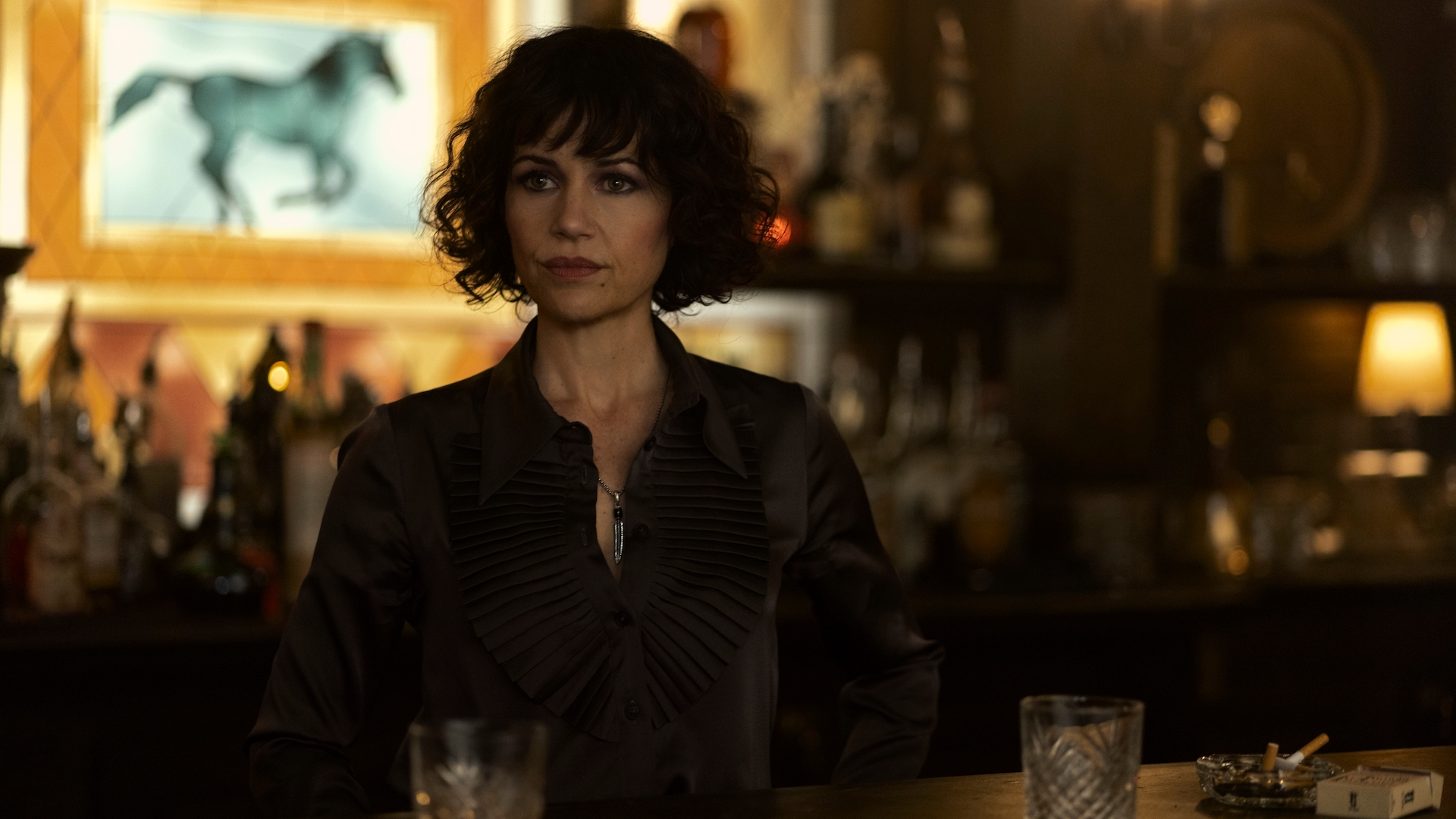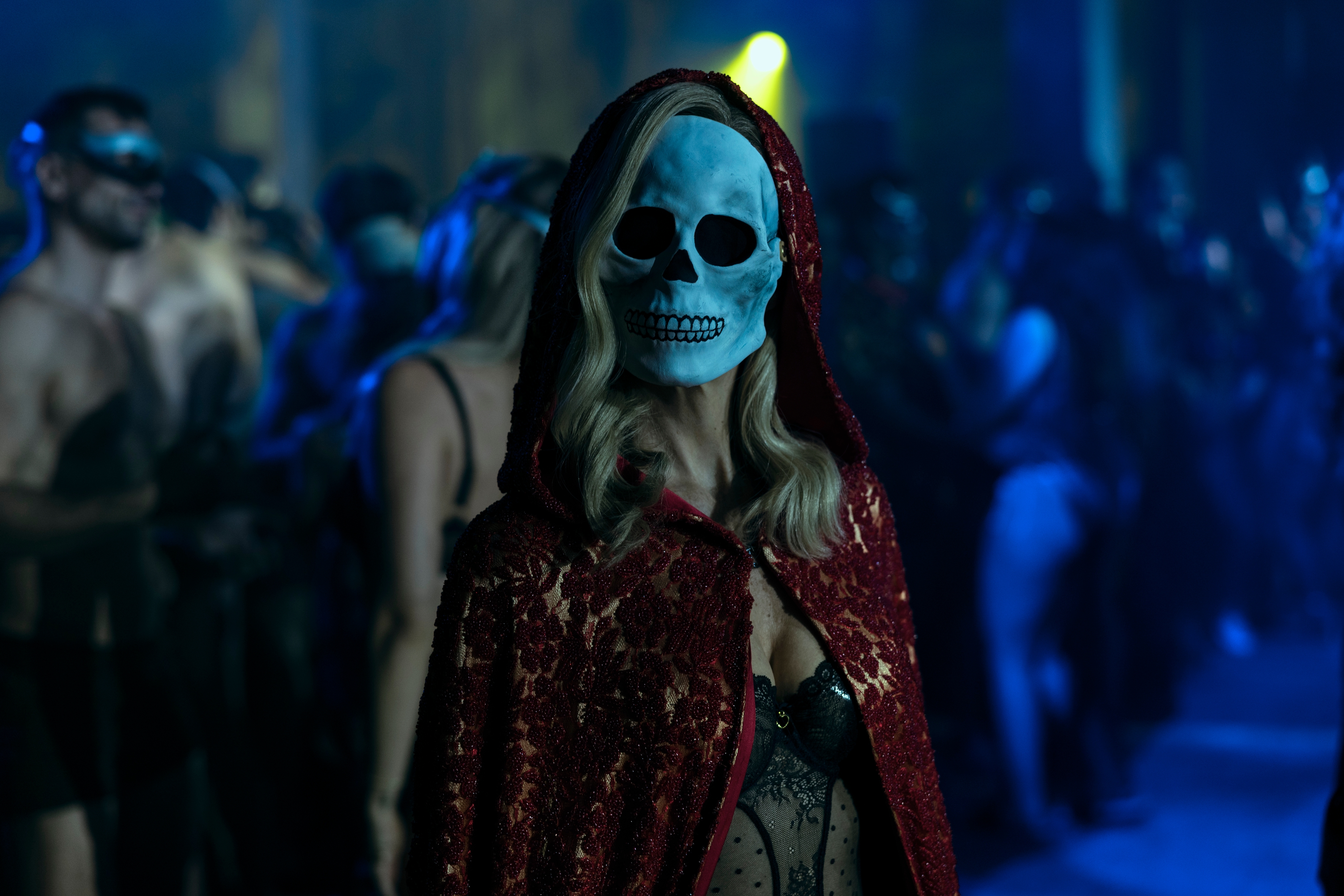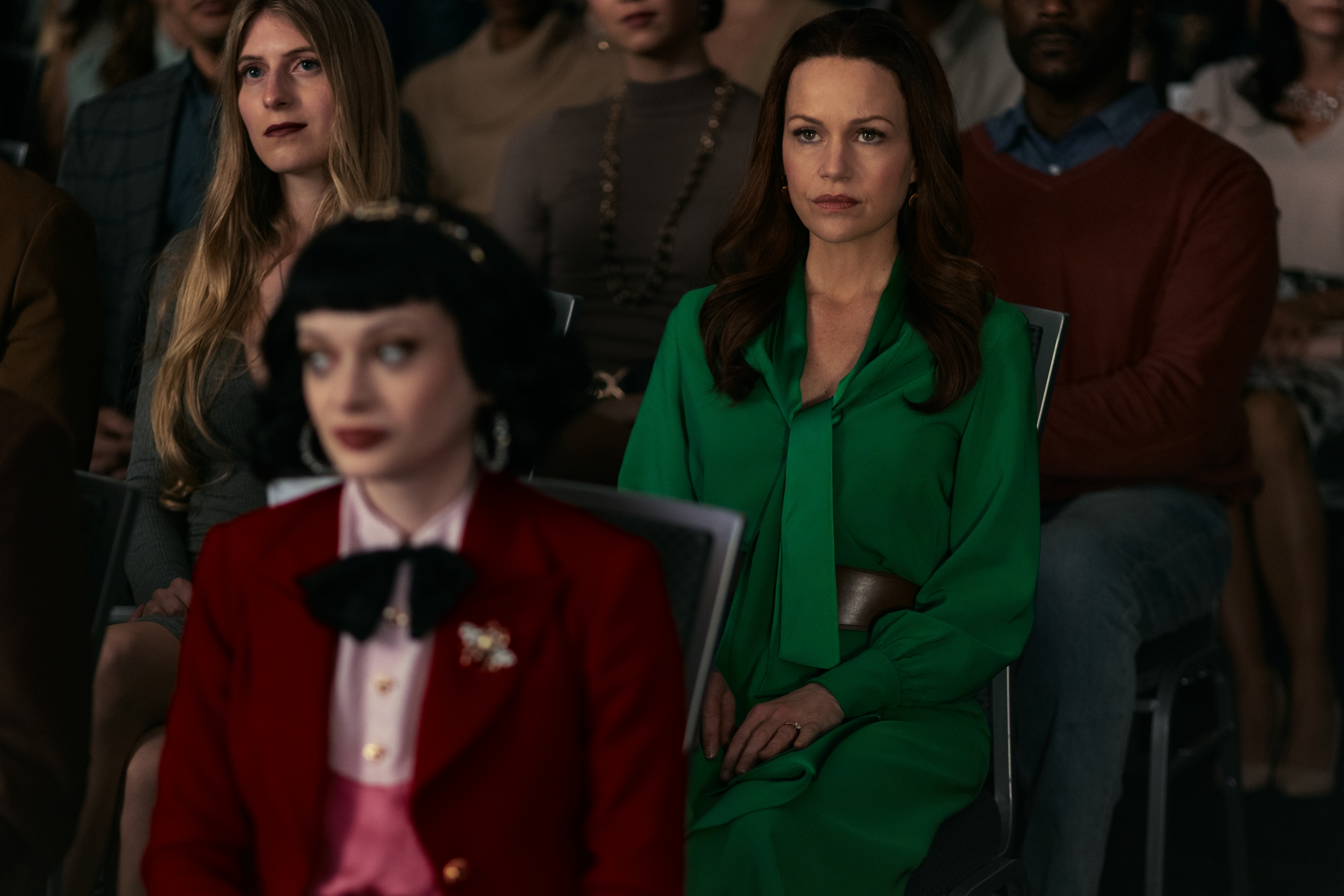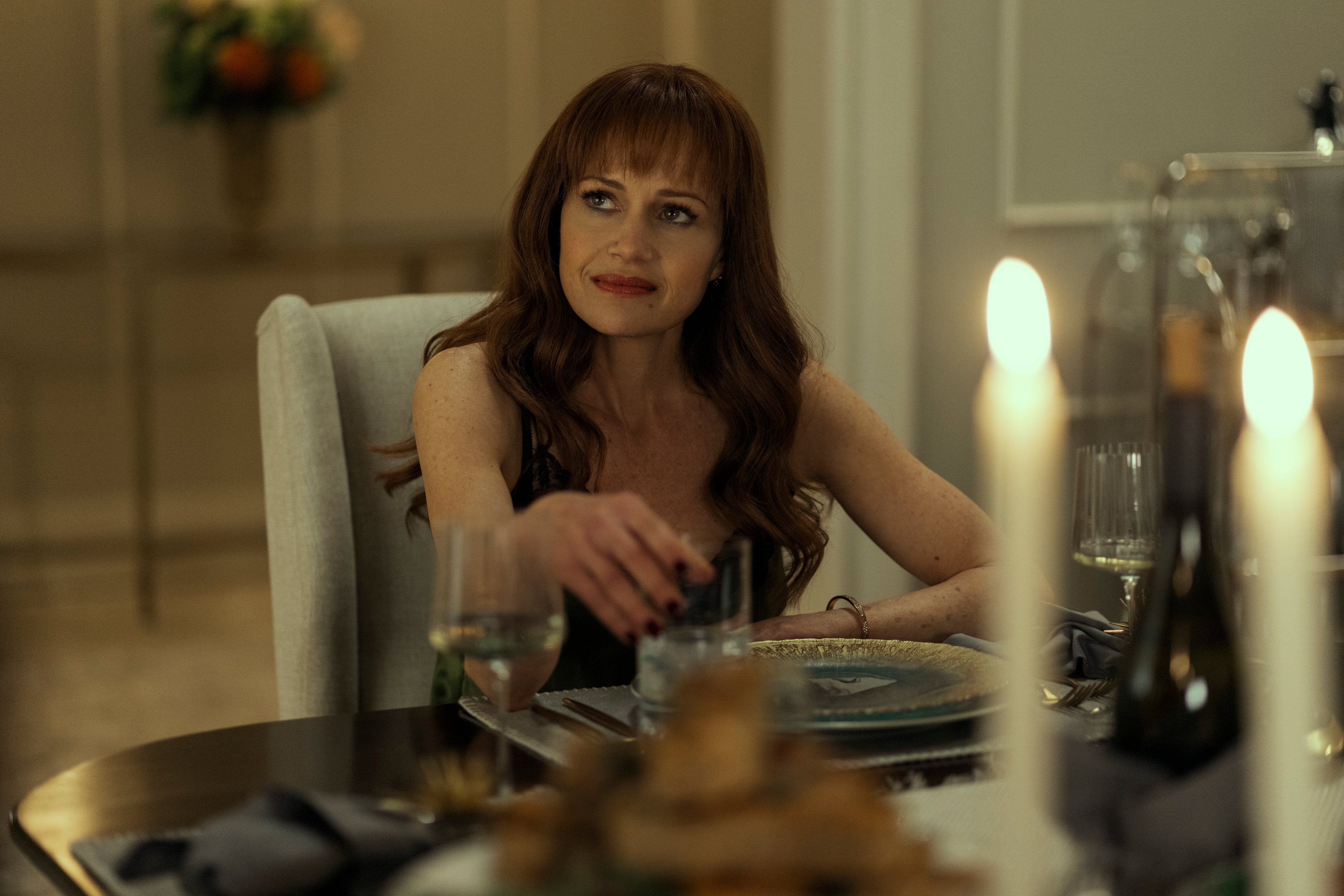Who Is Verna in 'The Fall of the House of Usher'?
While Verna is the name credited to Gugino's character, the mysterious figure goes unnamed throughout the series.

Warning: Spoilers for The Fall of the House of Usher included throughout. Mike Flanagan's latest horror series The Fall of the House of Usher is about a powerful family doomed for ruin. The dark thrill ride—which is inspired by the works of Edgar Allan Poe and mixes classic, bone-chilling horror with Succession levels of social critique—follows the Ushers, a multi-generational family at the helm of a pharmaceutical empire led by self-made, corrupt CEO Roderick (Bruce Greenwood). Over the course of eight episodes, viewers see the scope of the family's reach, as they've become ultra-wealthy off of a painkiller that has contributed massively to the show universe's opioid epidemic. We also see each of Roderick's six children fall victim to unthinkable fatalities, each one centered on the specific sibling's vices, insecurities, and perversions fueled by greed. The center of all of this mayhem and destruction is one mysterious woman, a shape-shifting avenging angel of sorts, known as Verna (played by Carla Gugino).
Verna's true identity is the complex mystery threading all of the deaths together, as viewers wonder why the figure is targeting the Ushers and what her decades-long history is with Roderick and his calculating twin sister Madeline (Mary McDonnell). It isn't til the finale that TFHU finally answers the many questions about Verna that have built up throughout the series, while also leaving some aspects of her character up to interpretation. And of course, we eventually learn what iconic Poe character serves as her inspiration. Read on for a breakdown of everything Verna represents in The Fall of the House of Usher.
She brings unimaginable death to the Usher family.
While Verna is the name credited to Gugino's character, the mysterious figure goes unnamed throughout the series, which plays out through layers of flashbacks showing how the elder Ushers rose to power and how the second generation meets its downfall. As each of the Usher siblings meet their gruesome, gruesome deaths (my favorite was Victorine's Tell-Tale Heart-inspired episode, if anyone was wondering), Verna shows up as the instigator and the final blow to their mortality (and often their sanity). Sure, each of the siblings have already set the stage for their destruction, but Verna provides the final push, the final snap.
Roderick and Madeline eventually figure out that it's Verna coming after their enforcer Arthur Pym (Mark Hamill) finds footage of her at each of the crime scenes. It becomes clear that she wants to be caught, as eventually she appears before and taunts both Roderick and Madeline with the knowledge that the brother and sister themselves doomed each of their predecessors to death. However, viewers don't find out just why this woman is out to destroy the Ushers until episode 8, "The Raven."

She first met Roderick and Madeline Usher on the night they solidified their future.
On New Year's Eve 1980, Roderick and Madeline (played in their younger versions by Zach Gilford and Willa Fitzgerald) attend a party where he's celebrated as the future of Fortunato, after he sabotages Dupin's (Malcolm Goodwin) investigation into the company's fraud. Following the corporation's victory, Roderick's boss Rufus Griswold (Michael Trucco) proclaims that Roderick's now his right-hand man and the person he trusts more in the world, and he even is going to build adjoining offices in the company's new building. It's a bit much, but it very clearly signals that Roderick has gained enough power that it's time for him to enact his and Madeline's plan to make the transition from partner to sole CEO. And for Edgar Allan Poe nerds, the show teases their plot as Madeline presents Rufus with a bottle of Amontillado wine.
Madeline soon seduces an obviously-drugged Rufus and leads him to a wing of the new building that's still under construction. The pharmaceutical exec passes out, and when he comes to, Madeline and Roderick have him shackled and are about to finish the brick wall that will entomb him in the new building. The duo plans to tell the board about Rufus's legit crimes (including several layers of corruption as well as grave-robbing and setting up Roderick as a patsy), and explain that he fled to some island without extradition rather than face the Feds. With Rufus gone (and dead, though only Madeline and Roderick would know), the board would nominate his best possible successor: Roderick, who's already escaped the wrath of the Feds once.
After leaving Rufus to his death, the twins head to a neighborhood bar for an alibi, where, working behind the bar, is Verna. She befriends the duo throughout the night, and when they're eventually the last ones remaining, she offers a deal to them. They'll get away with killing Rufus and achieve all of their goals, with luxury and comfort beyond their wildest dreams and no legal consequences their entire life. In exchange, the price is deferred to the next generation, with the bill coming due right before Roderick dies. His bloodline dies with him, including Madeline.
Get exclusive access to fashion and beauty trends, hot-off-the-press celebrity news, and more.
After Verna lays out the terms, both of the Ushers quickly agree to it. Verna even pours them some absurdly expensive cognac to seal the deal. As they walk out of the bar at daybreak, both Madeline and Roderick consider their trippy conversation, and Roderick wonders aloud if she meant everything she said. Before he can even complete the question, they turn back and see a derelict, boarded-up building where the bar stood just seconds ago. The only trace that's left? An image of a black raven, printed above the graffitied boards.

She's inspired by Edgar Allan Poe's most famous character.
Episode 8, "The Raven," includes the show's most heartbreaking death, as Verna's story finally matches up to the legendary poem of the same name. Roderick's granddaughter Lenore (named after the heroine from Poe's poem) is the only lovable, non-corrupted Usher throughout the series, and even the patriarch admits she's the "best" of them. Unfortunately, she's also a part of his bloodline, so Verna comes for her on the night of Victorine, Tamerlane, and her father Frederick's funeral. In the emotional scene, which takes place in a guest room at Roderick's mansion, Verna admits that this is the part of her job that brings her no joy, and tells the teenager that her mother Morri will survive from the acid burns she suffered in episode 2. Morri will go on to found a nonprofit that will do genuinely good work and affect millions of lives, all inspired by Lenore and baring her name. Lenore is left with that last glimmer of a hopeful future before she dies peacefully in an instant sleep.
Soon after, Roderick discovers his granddaughter's body and is devastated, showing a more emotional response than he did to any of his six children's deaths. As thunder roars outside and flashes of lightning illuminate the room, Roderick sees a raven perched in the corner. The raven, one of Verna's forms, flees and he follows it to the living room, where the CEO brandishes a fire iron ready to attack. As he stares at the raven, he begins to see classic Haunting of Hill House-style visions of Lenore's spirit all around him. The raven moves to perch atop a marble bust above his fireplace, and a vision of Lenore's dead body appears between the man and the bird. Roderick breaks down into tears as all this happens, while his voiceover recites the poem's final stanza.
"And the Raven, never flitting, still is sitting, still is sitting/ On the pallid bust of Pallas just above my chamber door;/ And his eyes have all the seeming of a demon’s that is dreaming,/ And the lamp-light o’er him streaming throws his shadow on the floor;/ And my soul from out that shadow that lies floating on the floor/ Shall be lifted—nevermore!"
If that isn't creepy enough, the present-day timeline also shows that Verna is still taunting him about Lenore's death. The show takes place through a story within a story, as Roderick recounts each of his children's deaths to his lifelong foe Dupin (Carl Lumbly). After hearing of Lenore's demise, Dupin says that's impossible, as Lenore's been texting Roderick all night. However, it turns out that Madeline has been working on a sentient AI (kill me) built from a person's social media profiles, and used Lenore's info as a beta test. The AI has been texting Roderick nonstop, but it's broken and is only delivering misspelled variations of the poem's famous repeating word, "Nevermore."

She's been dealing with the world's most wealthy families for decades.
So, what is Verna exactly? Be she a demon, the Raven, or the "Devil at the Crossroads" myth personified, her M.O. is offering corrupted people their wildest dreams fulfilled, in return for something other than their soul (which, in the case of Madeline and Roderick, was already lost when they killed Rufus Griswold earlier that night). In the surprisingly tender scene between Verna and Pym, she explains that she asks the people she deals with for "true assets": spouses, children, familial connections. "Everyone loves something, and in that love is collateral," she explains.
TFHU is overrun with pop culture references, and this touch of real life breaking through is also part of Verna's backstory. In episode 6, Pym presents Madeline with all of the info he finds on the mystery woman, including pictures of Verna with famous figures from throughout history. The notable list includes business tycoons, political dynasties, and ultra-wealthy families whose fortunes have been built on rivers of exploitation, discrimination, poverty, and directly or indirectly, death and suffering of the many to enrich the few. Verna even mentions one of her "clients" directly in the conversation with Pym, saying that she told one of these charges he could "stand in the middle of Fifth Avenue and shoot somebody, and it won't cost [him] a thing." (Yes, she means the former president.)
The full list mentioned as Verna's "clients" includes:
One of the reason TFHU has drawn so much comparison to Succession since its premiere is that Flanagan (who's a credited writer on seven of the season's eight episodes) spends the entire series pointing a condemning finger at the Ushers, extending his satirical gaze to the real-life one percent. In one of the show's final scenes, which takes place on the same rainy night of Lenore's death, Verna crafts a physical representation of the many people who have lost their lives due to their addiction to the Ushers' painkiller Ligadone. She shows Roderick people falling from the sky, representing the one person every five minutes—in the States at least—to die in the opioid epidemic spurred by the drug. Then she opens the scope to the whole world and the bodies are numerous as rain. Verna makes it clear that this is Roderick's legacy. This is what he did with the endless power and lifelong get-out-of-jail-free card he traded his children's lives for. (Literally in two cases, as Frederick and Tamerlane were already alive when he made the deal.) That's what Verna is, in this story of wealth, greed, and death. She's consequences.
Quinci LeGardye is a Culture Writer at Marie Claire. She currently lives in her hometown of Los Angeles after periods living in NYC and Albuquerque, where she earned a Bachelor’s degree in English and Psychology from The University of New Mexico. In 2021, she joined Marie Claire as a contributor, becoming a full-time writer for the brand in 2024. She contributes day-to-day-content covering television, movies, books, and pop culture in general. She has also written features, profiles, recaps, personal essays, and cultural criticism for outlets including Harper’s Bazaar, Elle, HuffPost, Teen Vogue, Vulture, The A.V. Club, Catapult, and others. When she isn't writing or checking Twitter way too often, you can find her watching the latest K-drama, or giving a concert performance in her car.